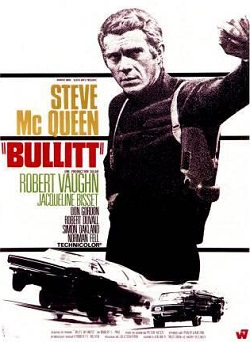Since the end of my "Investigating Film Noir" course, a few former students have decided to continue this investigation specific to Neo-Noir. How it is defined is up to much speculation and debate; however, one person composited a list of qualities to help determine what constitutes a true Neo-Noir film. I'm very much a scholar of the classics, but I've decided to delve into the world of Neo-Noir. My first review follows:
Bullitt (1968)
Directed by Peter Yates

Really Brief Overview
A San Francisco district attorney, who is also an ambitious politician, has a "star witness" who is about to testify in a Senate Subcommittee hearing on organized crime. He puts The SFPD, specifically Frank Bullitt, in charge of protective custody for 40 hours until his court appearance.
Analysis
Bullitt gets 12 out of 16. Usually when films noir are based off police procedure and investigation there may be fewer items to check off on the list below. What seemed to stand out most for me was Steve McQueen's eyes. They're a character within the character. We want to see what he sees; we need to know. And it's usually this monitoring that advances the plot.
The cinematography is on point with traditional film noir, not only with the chiaroscuro but also the camera angles. The one scene I liked best was McQueen at a high society party; the angle is looking up from the floor and our protagonist is framed by the legs of female patrons standing around (nothing sexual. It's like being a small child or a pet that sees nothing but legs in their line of vision).
The San Francisco Bay Area is also prominently featured throughout the film. There are no closed (studio) sets. Some locations include SFO; San Francisco's Mission District, North Beach, Downtown, Embarcadero, Russian Hill, Marina District; Guadalupe Parkway in Brisbane; Sausalito. Side note: The taxi driver (played by Robert Duvall) says that the suspect made a long distance call...to San Mateo. It's only 15 miles away. I just started laughing.
My only negative was the car chase scene (which is what Bullitt is praised for). Be forewarned. You WILL get dizzy. We see them pass the same green VW Beetle at least 5 times. And it's geographically impossible to make that chase. How does one get from Mission District to North Beach in mere seconds? But I'm a native, so no one outside of SF would probably care.
What I really liked about this film was the jazz score. It also contains live performances by local jazz musicians to create realism.
1. Chiaroscuro for black and white films, intense or muted color in movies filmed in color (In either black and white or color, the technique is used to enhance the mood and/or the emotional content.)
Yes; muted color in some scenes.
2. Flashbacks
No, but this is an investigation where Bullitt has to continuously backtrack and interview witnesses, but the scenes stay in real time.
3. Unusual narration
No
4. Crime/planning a crime (usually—but not always—murder)
Yes; stalking, murder, the car chase
5. Femme fatale and/or homme fatale
I'll say yes. I definitely see the DA as homme fatale as well as the witness because his actions do result in the deaths of innocent victims.
6. The instrument of fate
I would say YES. Particularly during the investigation where one major question is answered.
7. Angst (for example, guilt, fear, self-doubt, confusion, and so on; in other words, anything that contributes to angst)
Yes, the title character seems to work on his own accord with little regard to what his superiors think.
8. Violence or the threat of violence
Yes. We have a "protected witness" whose life is in danger.
9. Urban and nighttime settings
Yes...my hometown of San Francisco. Night time settings during film's climax as well as more high tension scenes.
10. Allusion to post–World War II (or any postwar) themes (optional)
No.
11. Philosophical themes (existentialism in particular) involving alienation, loneliness
Yes; particularly in the scene between Bullitt and his girlfriend as she is questioning the man she "thought she knew".
12. Psychology (hypnosis, brainwashing, manipulation, amnesia)
Yes, of course. It's politicians, DAs, and police officers. It's in their nature to be masters of manipulation.
13. Greed
Yes. The DA in the film has a clear agenda that best serve his interests.
14. Betrayal
Yes. DA feels betrayed by Bullitt, The state's witness betrays the DA.
15. No stark contrast between “good” and “evil” (characters, forces, emotion, and so on)
No. The lines are pretty clear. HOWEVER, Bullitt does break procedure (if not making quite illegal decisions) to move the investigation forward.
16. Expertise triumphs, perhaps rather than “good”
Yes.